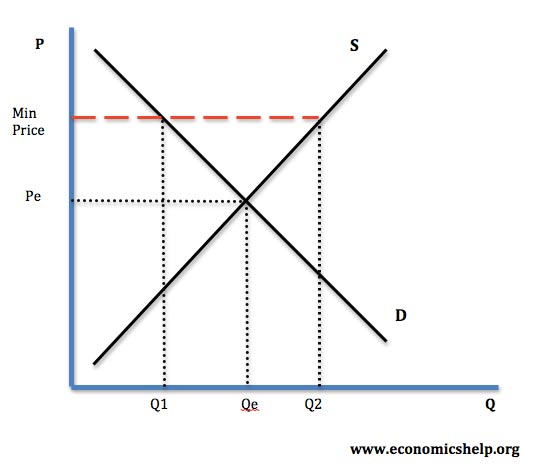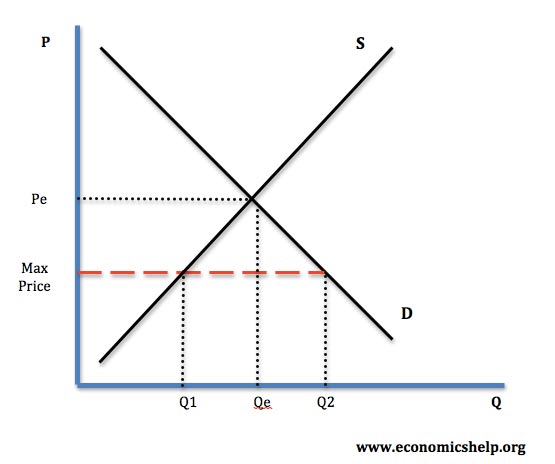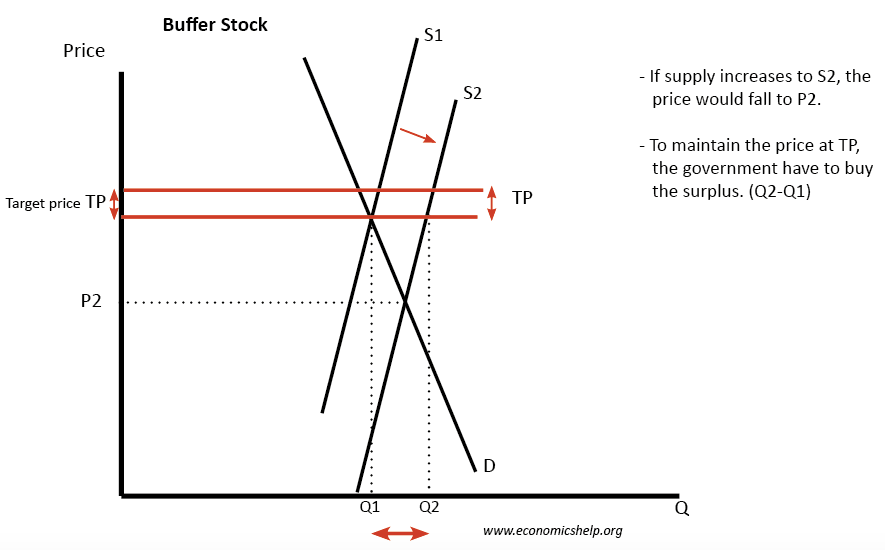Government price controls are situations where the government sets prices for particular goods and services.
Types of price controls
- Minimum prices – Prices can’t be set lower (but can be set above)
- Maximum price – Limit to how much prices can be raised (e.g. market rent)
- Buffer stocks – Where government keep prices within a certain band
- Limiting price increases – In a privatised monopoly (e.g. electricity, gas, water – where there is no competition) the government regulator may play a role in limiting how much prices can be increased. In the UK, regulators use a formula like RPI-X.
- Direct price setting – In a command economy, prices of goods may be set by the government.
Reasons for government price controls
Usually, prices are set the market forces (where supply and demand meet) But there are various reasons governments may wish to intervene in a free market to set prices.
- Make some goods more expensive (e.g. food to increase revenue of farmers or discourage demand for demerit goods.
- Make some goods cheaper (e.g. to make sure housing is affordable)
- To stabilise prices (e.g. prevent rapid fluctuations in the price of food)
Minimum Prices

A minimum price is when the government don’t allow prices to go below a certain level. If minimum prices are set above the equilibrium it will cause an increase in prices.
For example, the EU has used minimum prices for agriculture. It is argued farmers incomes are too low. Therefore, minimum prices have been used to increase prices above the equilibrium. This enables farmers to get a higher revenue.
Problem of minimum prices
The big problem is that this minimum price creates a surplus. Therefore, the government have to purchase the surplus to maintain a minimum price. The Common Agricultural Policy became very expensive because the minimum prices encouraged farmers to supply as much as possible.
- Disadvantages of CAP
- Minimum price for alcohol – prevent the problem of binge drinking
Related to minimum prices is the concept of a minimum wage
Maximum Prices

- This is when the government wish to prevent prices going above a certain level. If a maximum price is placed below the equilibrium, prices will fall.
- But if the price is below the equilibrium, demand will be greater than supply leading to a shortage.
- The government may wish to use maximum prices to reduce the cost of renting a house.
- The government may also use maximum prices for important food-stuffs or pharmaceutical drugs which it wants to make more affordable.
- Advantages and disadvantages of maximum prices
Buffer stocks
A buffer stock is a price control where the government seeks to keep the price within a certain band. It is effectively combining elements of maximum and minimum prices. The aim is to both stabilise prices (and incomes) for farmers and prevent shortages and high prices. If successful, the government buy surplus in a good harvest and then sell surplus if there is a shortage.
See: Buffer stocks
Limiting price increases
In a free-market economy, some industries are natural monopolies (the most efficient number of firms is one). In this case, it is not possible to have effective competition. In the absence of government regulation, the monopoly could charge excessively high prices. As a surrogate for competition, the government regulator can set prices (or limit price increases) to make sure the level of profitability is not excessive.
Regulation of monopolies is often controversial. Consumer groups claim regulators become guilty of ‘regulatory capture’ whilst companies can complain they are starved of funds for investment.
Direct price setting
In a command economy (Communist) the government play an important role in deciding what to produce, how to produce and what prices to charge. In this situation, market forces are ignored and the government set the most ‘socially efficient’ prices.
Related


advantages and disadvantages of maximum price control
what are the importance of controlling price
pls help me to find a answr. to my question what is the effect of people with rising production with price control
your comments about pricing control is very usefull for me thankyou
your idea was not useful for me.. kindly elaborate more
thank’s, the idea is useful and would like to help with,
advantages and disadvantages of government prices control policy.
what about goods prices control?
what are the main reasion behind you.
are price controls good or bad
Clear definition for price control. Thanks.
are there any differences among different industries while government control their prices? what’s the side effect of Government Price Controls? is it only useful in the short time? could you explain a bit? thank you
pls i need u 2 tell me if it is good 4 Nigeria 2 have a price control policy n with reasons pls
Pls analyse economic consequences of government price control policy in nigeria.thanks
what are some of the measures government should put in place in order to make maximum and minimum legislation effective?
They should make sure that the price is on the product or can be recognised. We are getting repped of in shops because of this. Its not fair we are paying taxes
Discuss and illustrate the two (2) main types of price controls that can be implemented by a government.